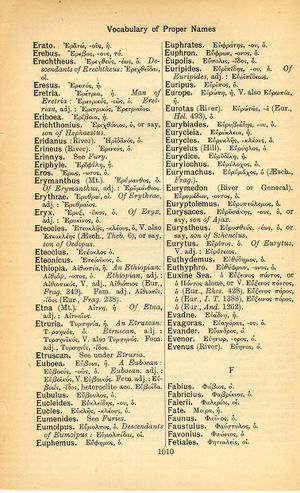Eteocles
Οὐδείς, ὃ νοεῖς μὲν, οἶδεν, ὃ δέ ποιεῖς, βλέπει → Quid cogites, scit nemo; quid facias, patet → nicht weiß man, was du denkst, doch sieht man, was du tust
English > Greek (Woodhouse)
Ἐτεοκλῆς, -κλέους, ὁ, V. also Ἐτεοκλέης (Aesch., Theb. 6), or say, son of Oedipus.
Latin > English (Lewis & Short)
Ĕtĕōclēs: is and ĕos, m., = Ἐτεοκλῆς,
I son of Oedipus and Jocasta, brother of Polynices; he was the cause of the Theban war, described by the Roman poet Statius in the Thebais, Cic. Off. 3, 21, 82; Hyg. Fab. 76; gen. Eteoclis, Stat. Th. 3, 214: Eteocleos, id. ib. 12, 421; acc. Eteoclea, id. ib. 7, 688.— Hence,
II Ĕtĕōclēus, a, um, adj., of Eteocles: contentiones, App. M. 10, p. 245, 30.
Latin > French (Gaffiot 2016)
Ĕtĕŏclēs,¹⁶ is ou ĕos, m. (Ἐτεοκλῆς), Étéocle [fils d’Œdipe, frère de Polynice qui vint guerroyer contre lui ; ils s’entretuèrent dans un combat] : Cic. Off. 3, 82 || -ēus, a, um, d’Étéocle : Apul. M. 10, 14.

